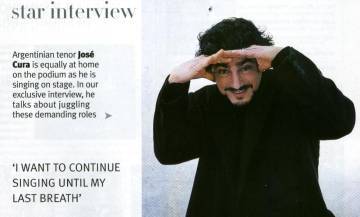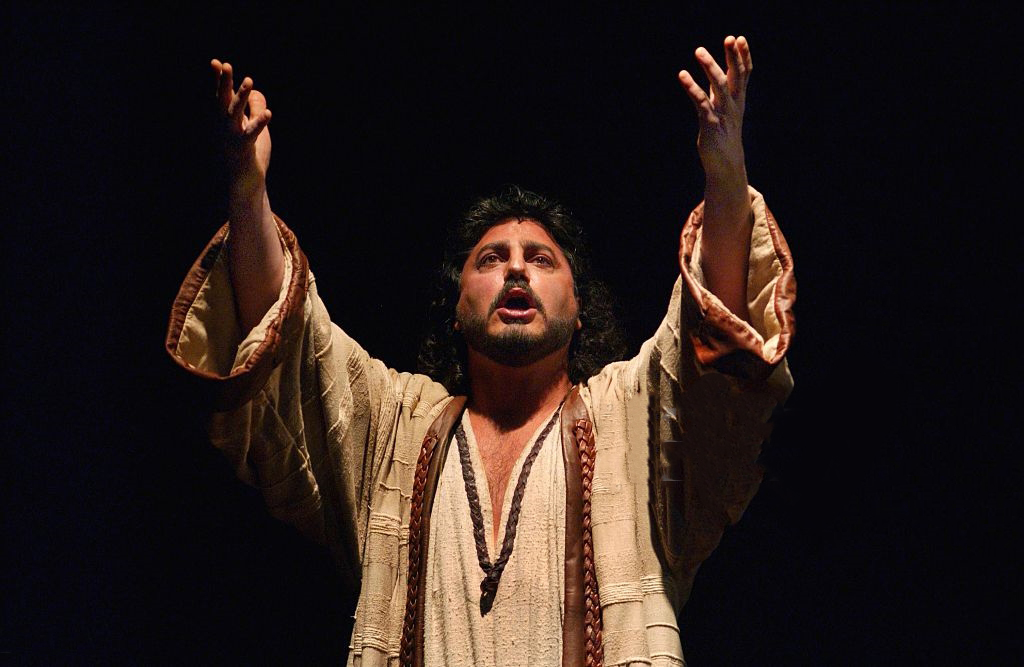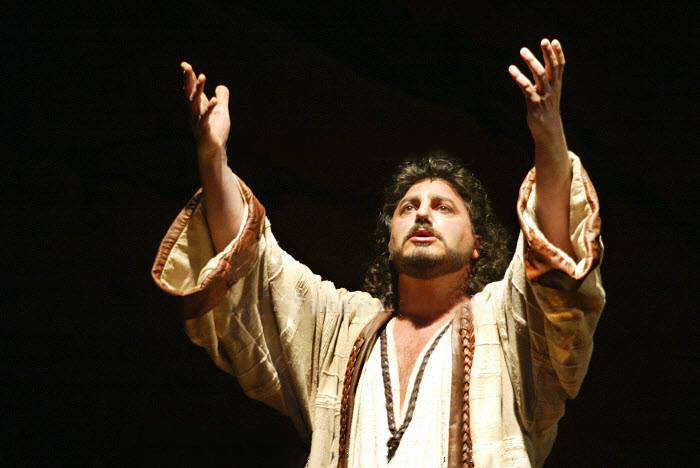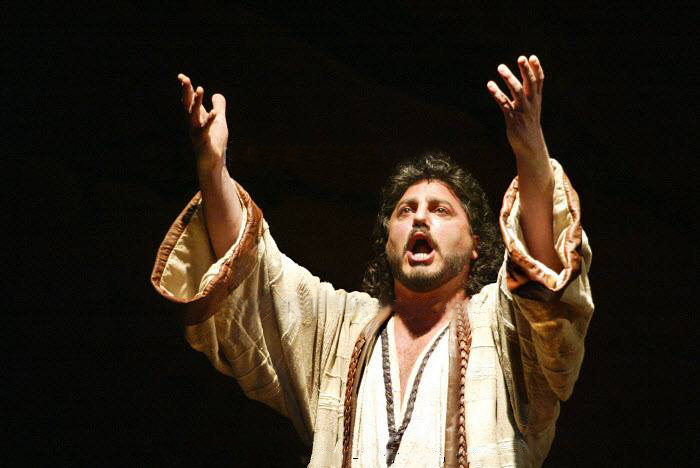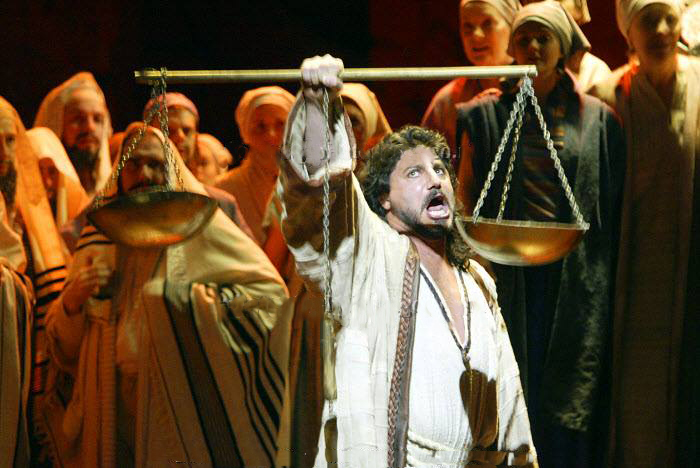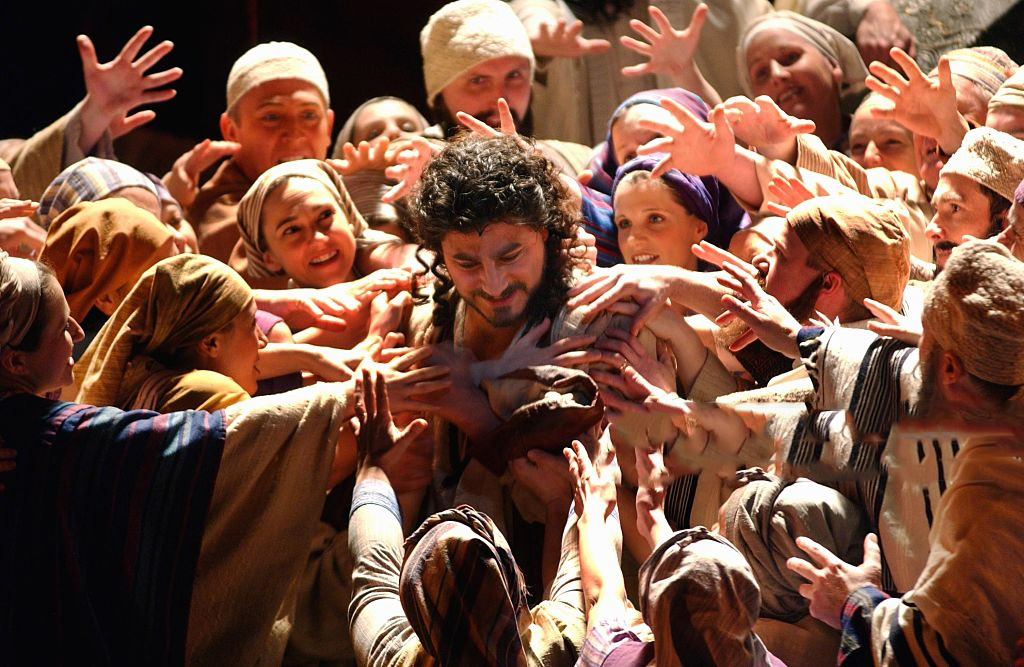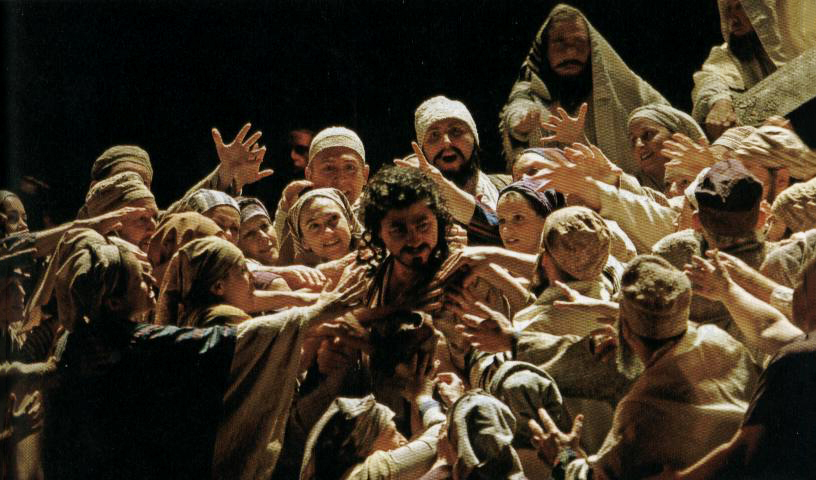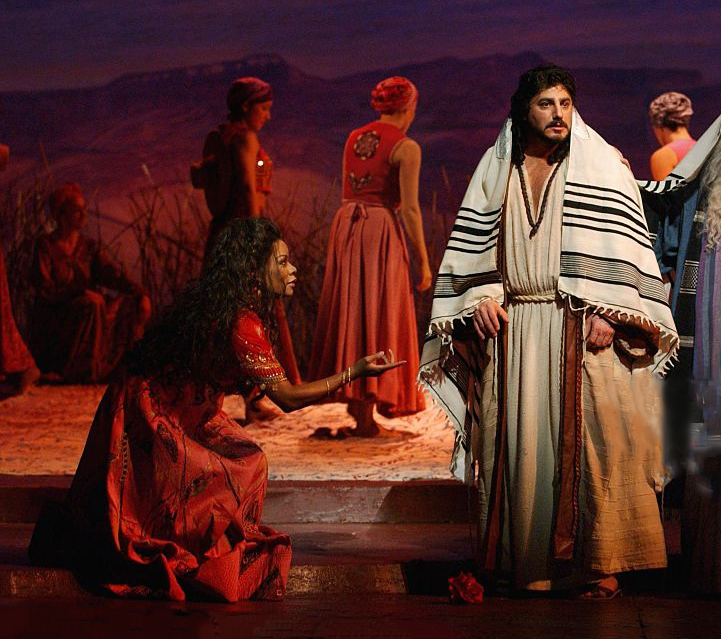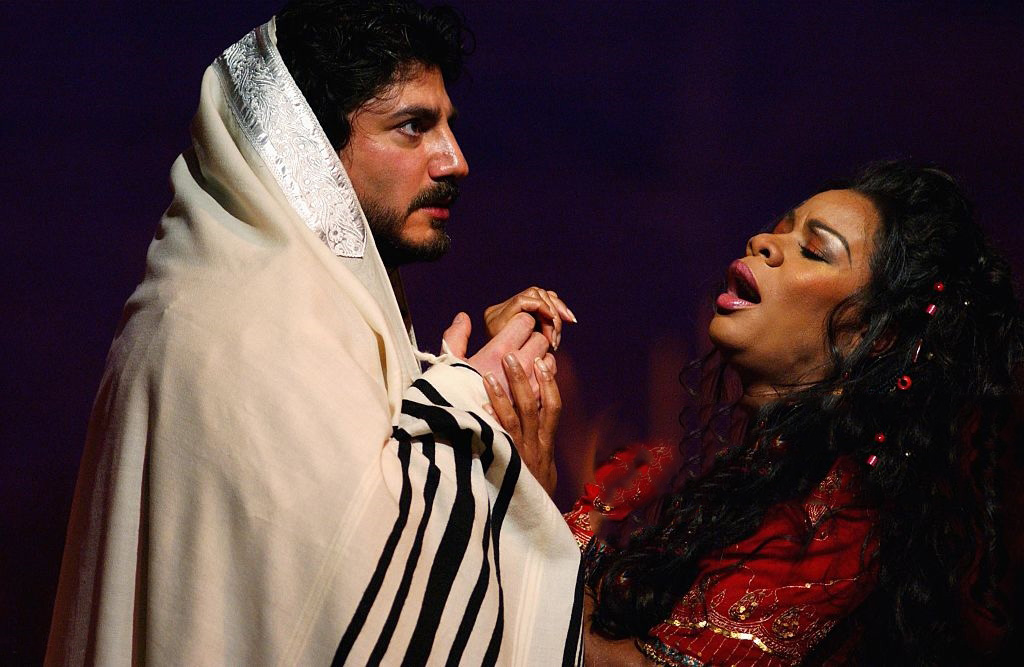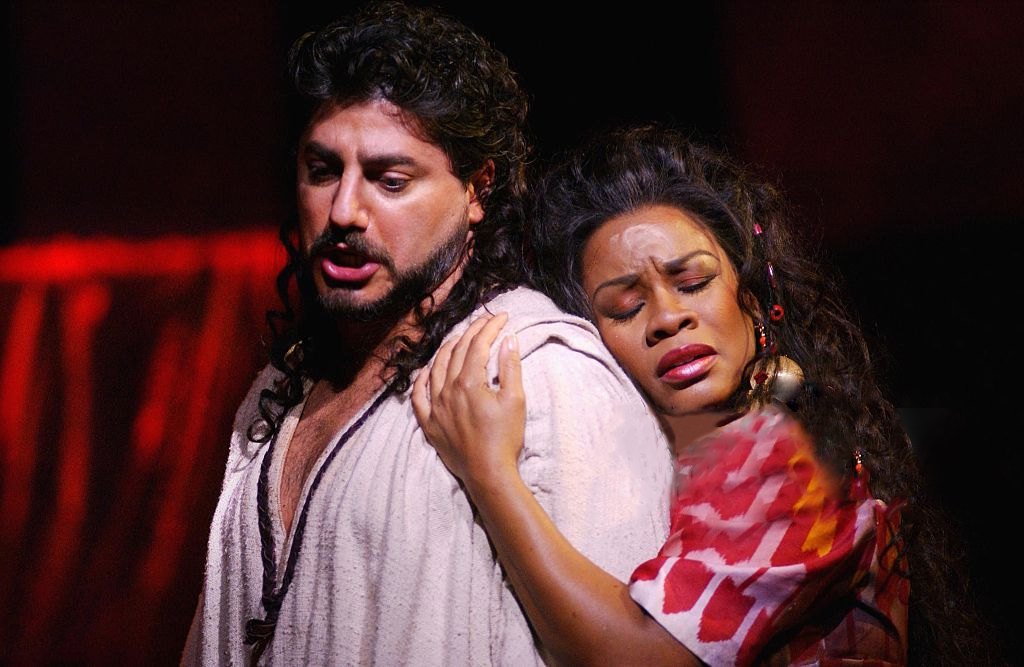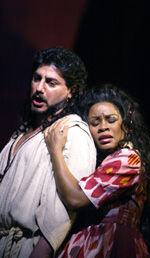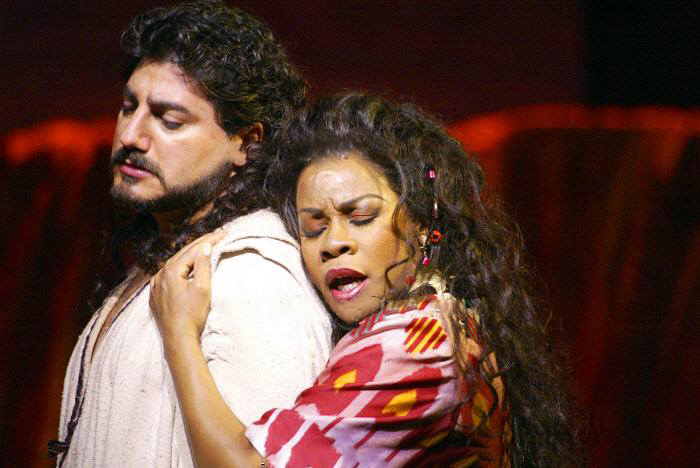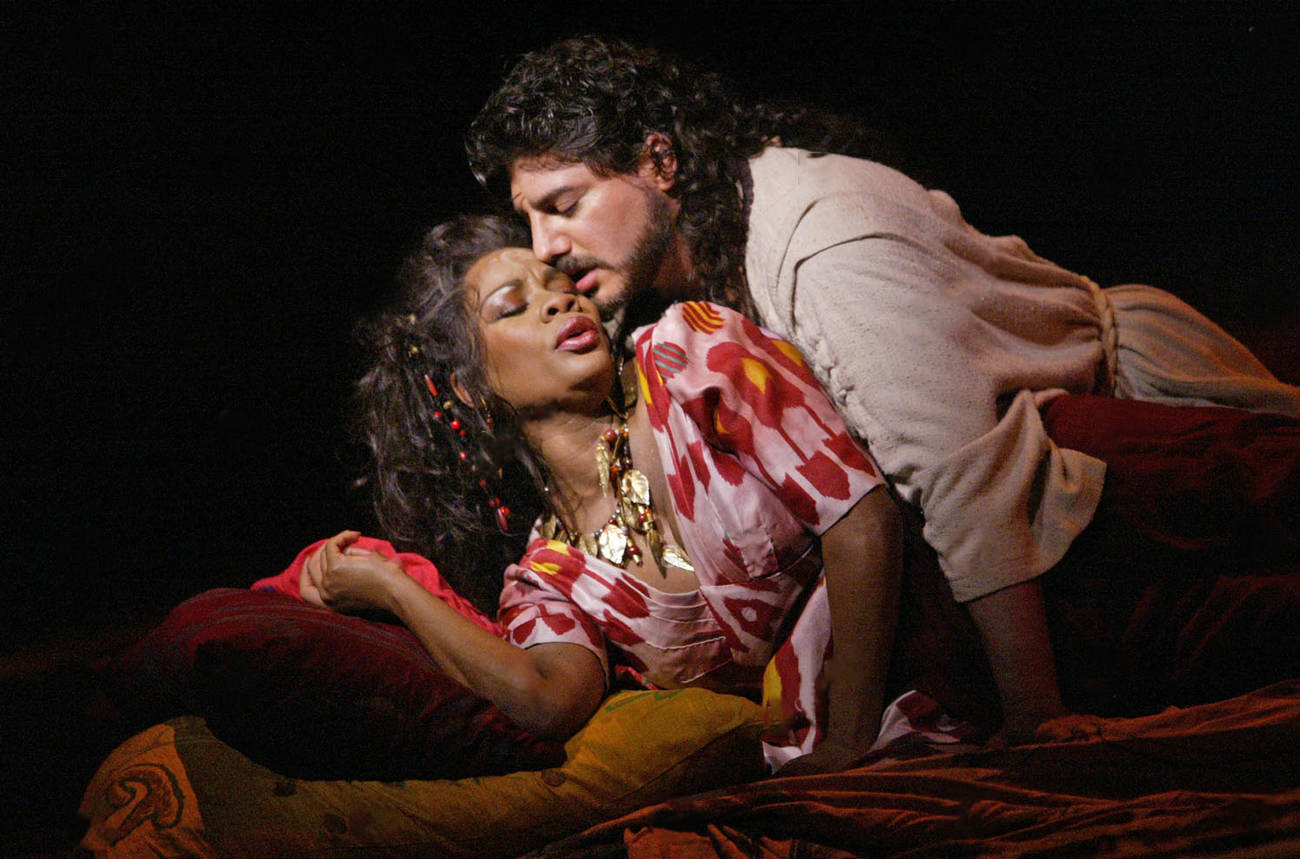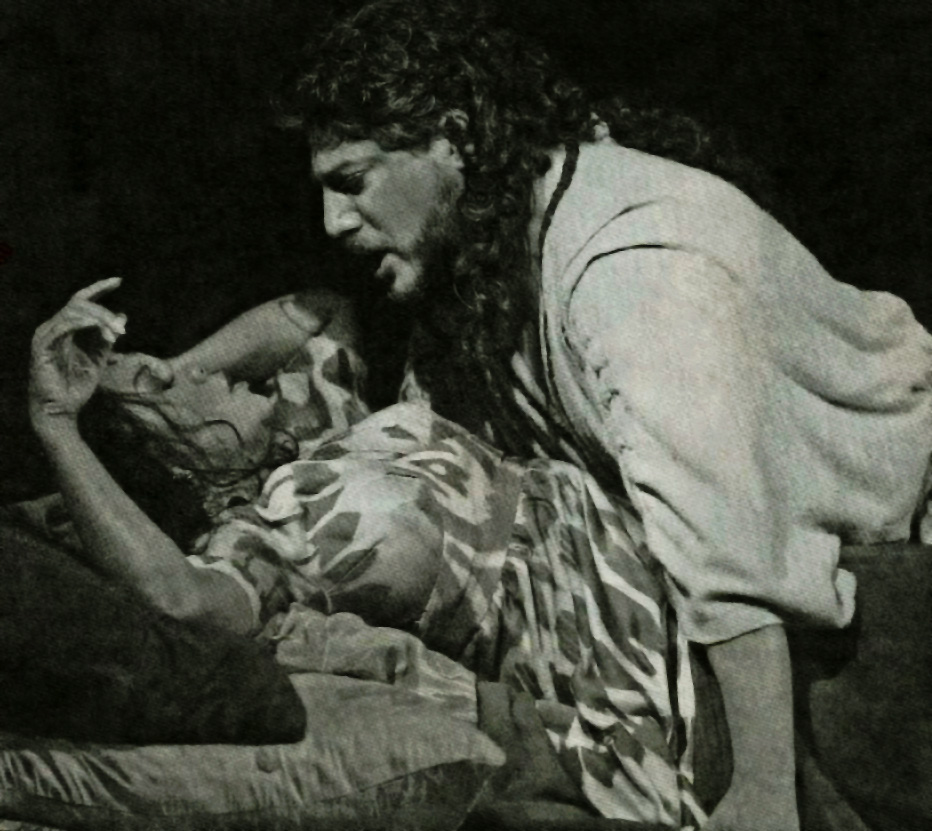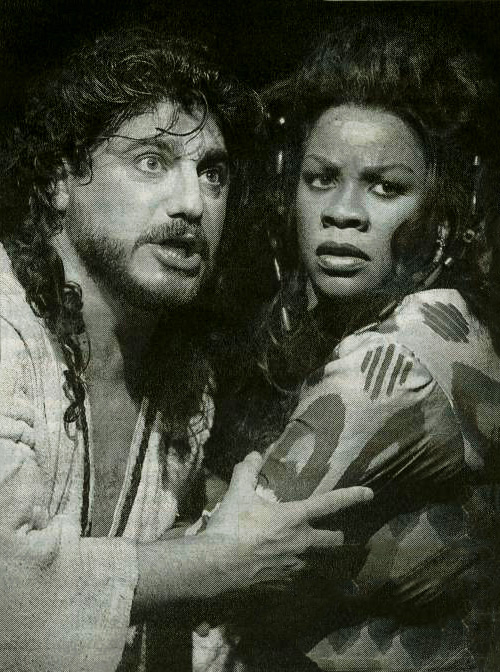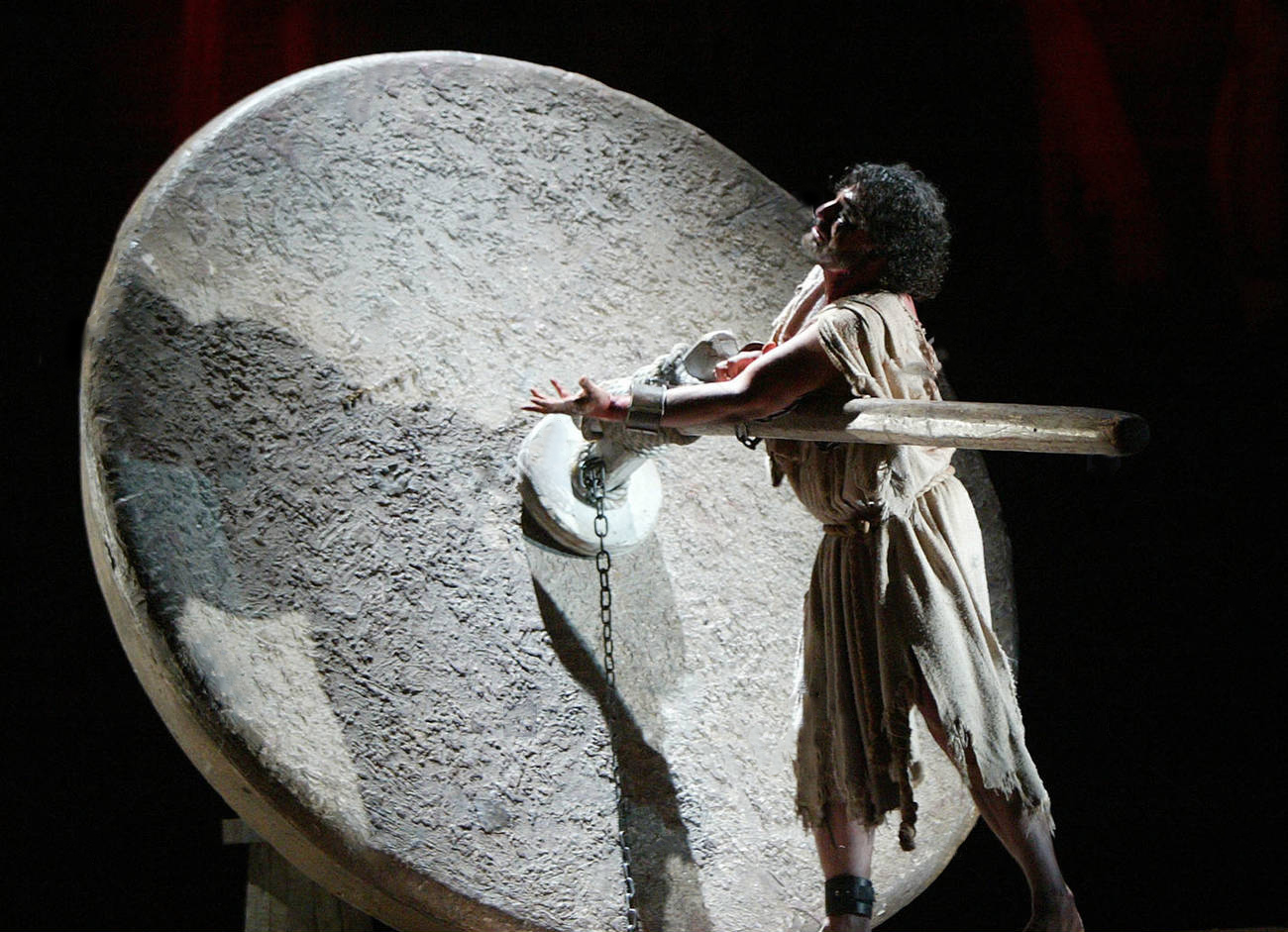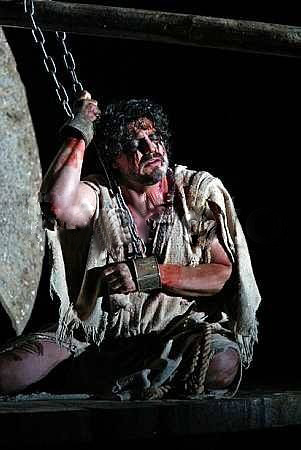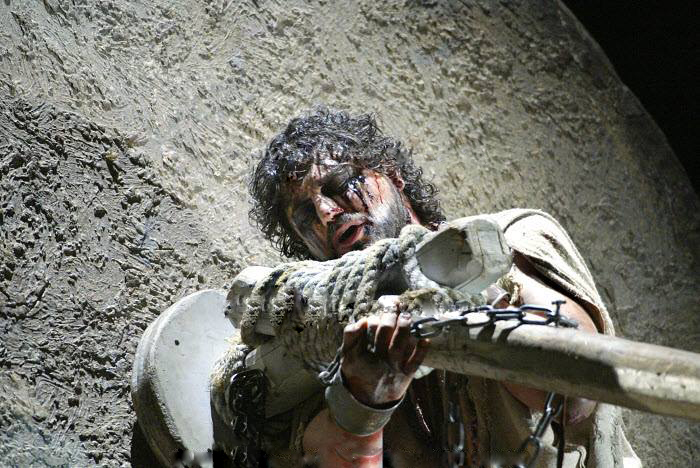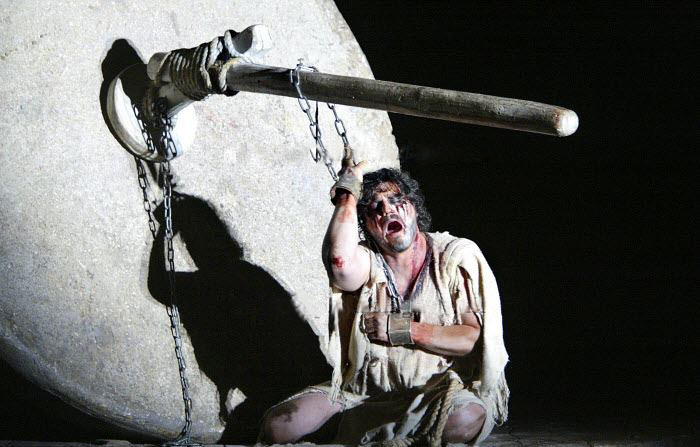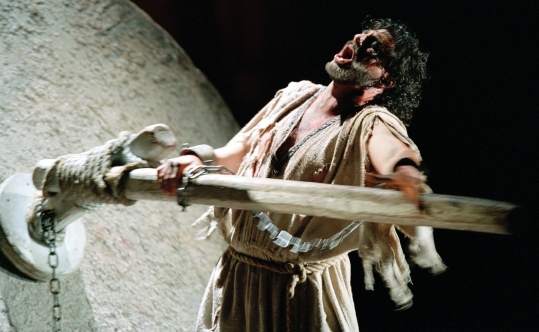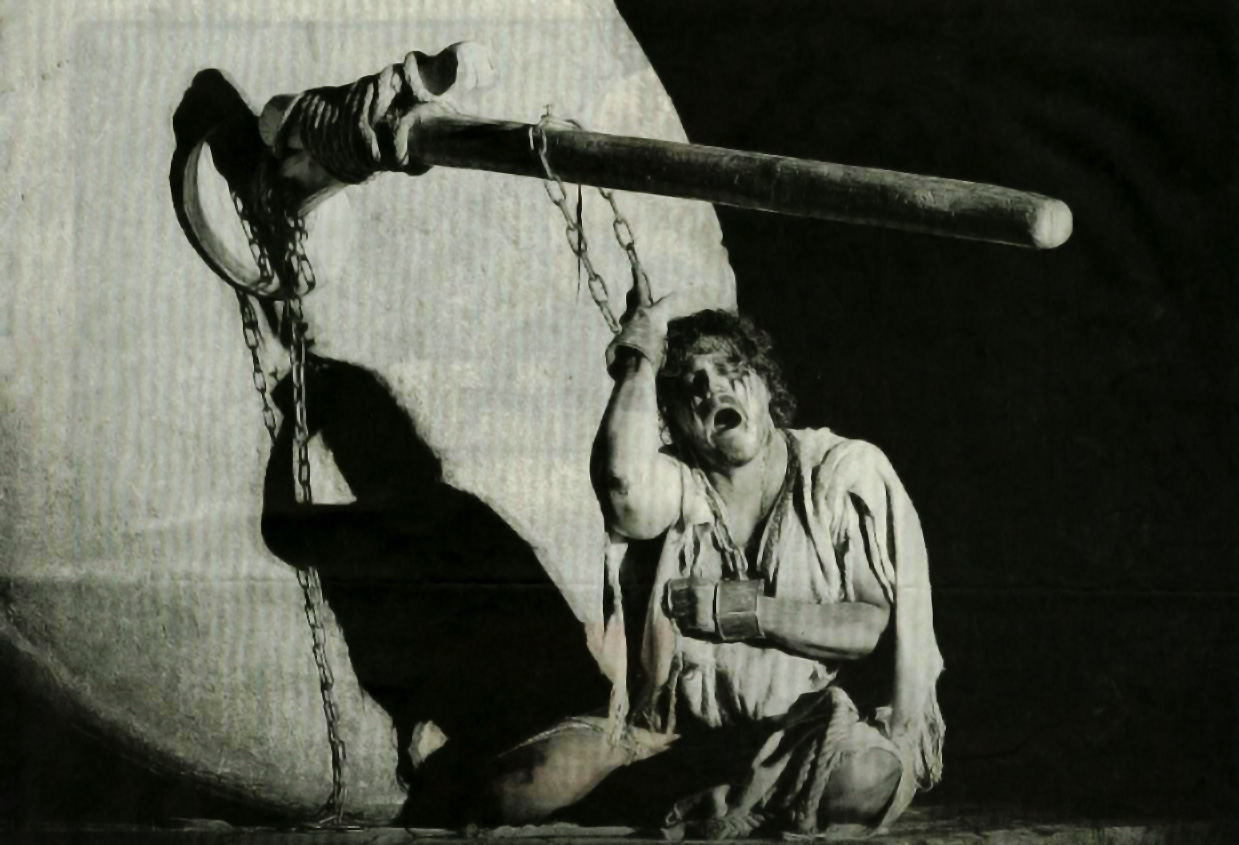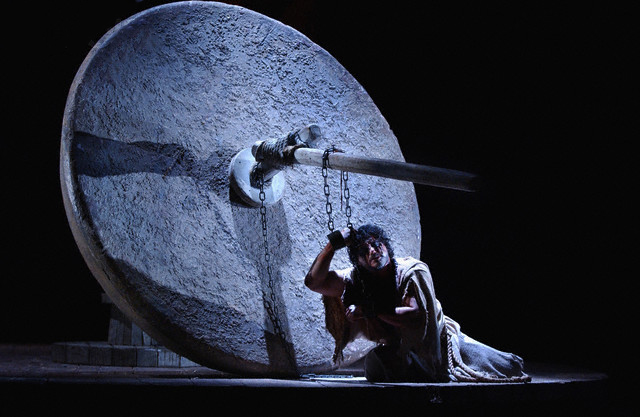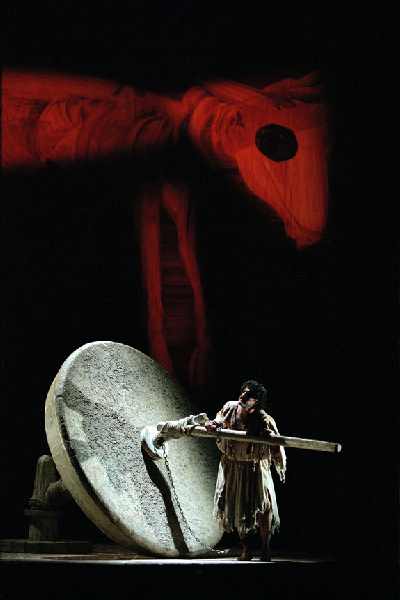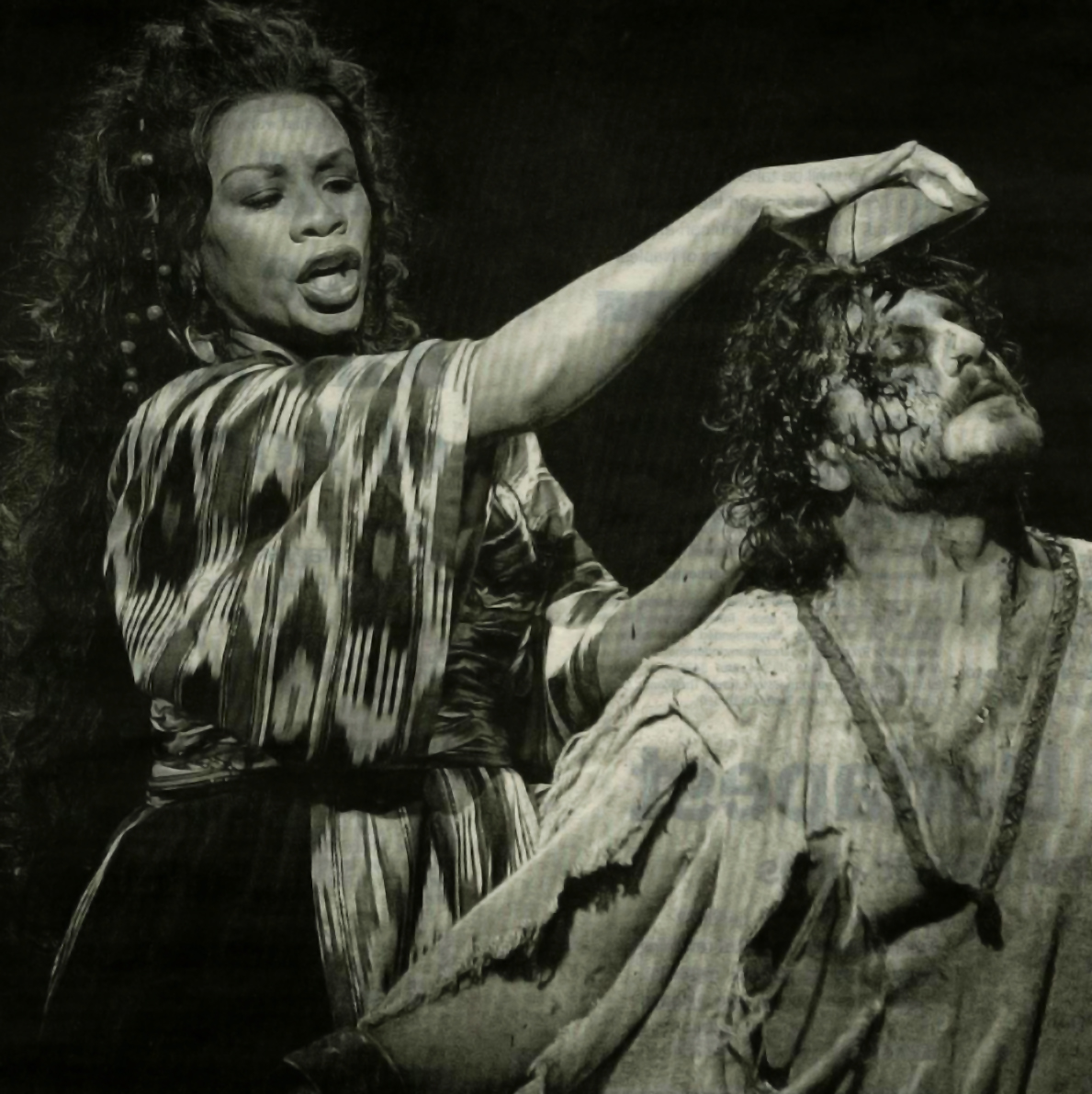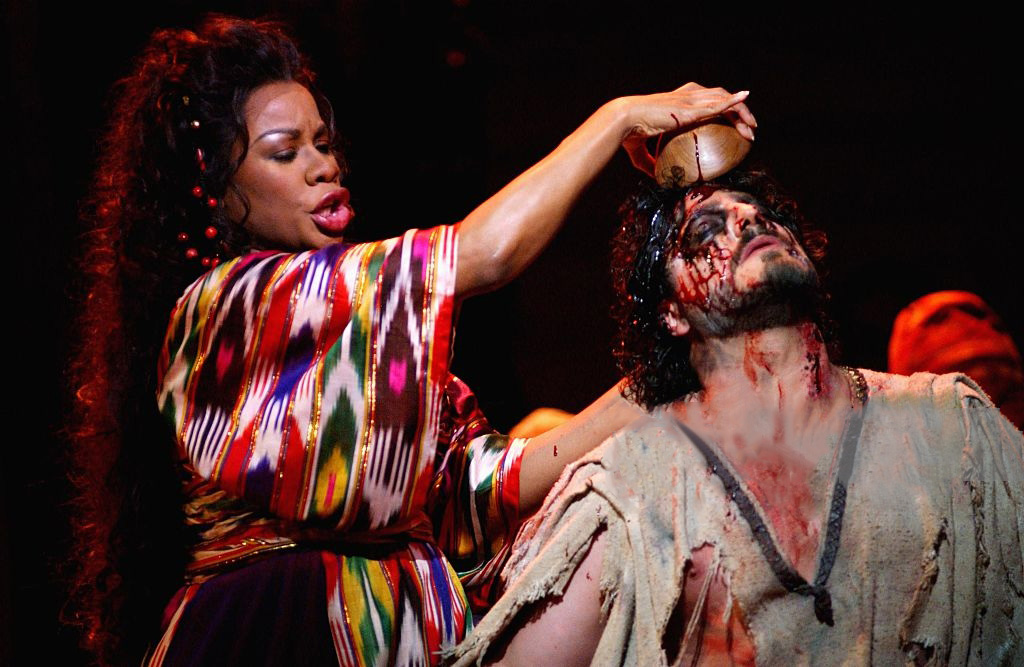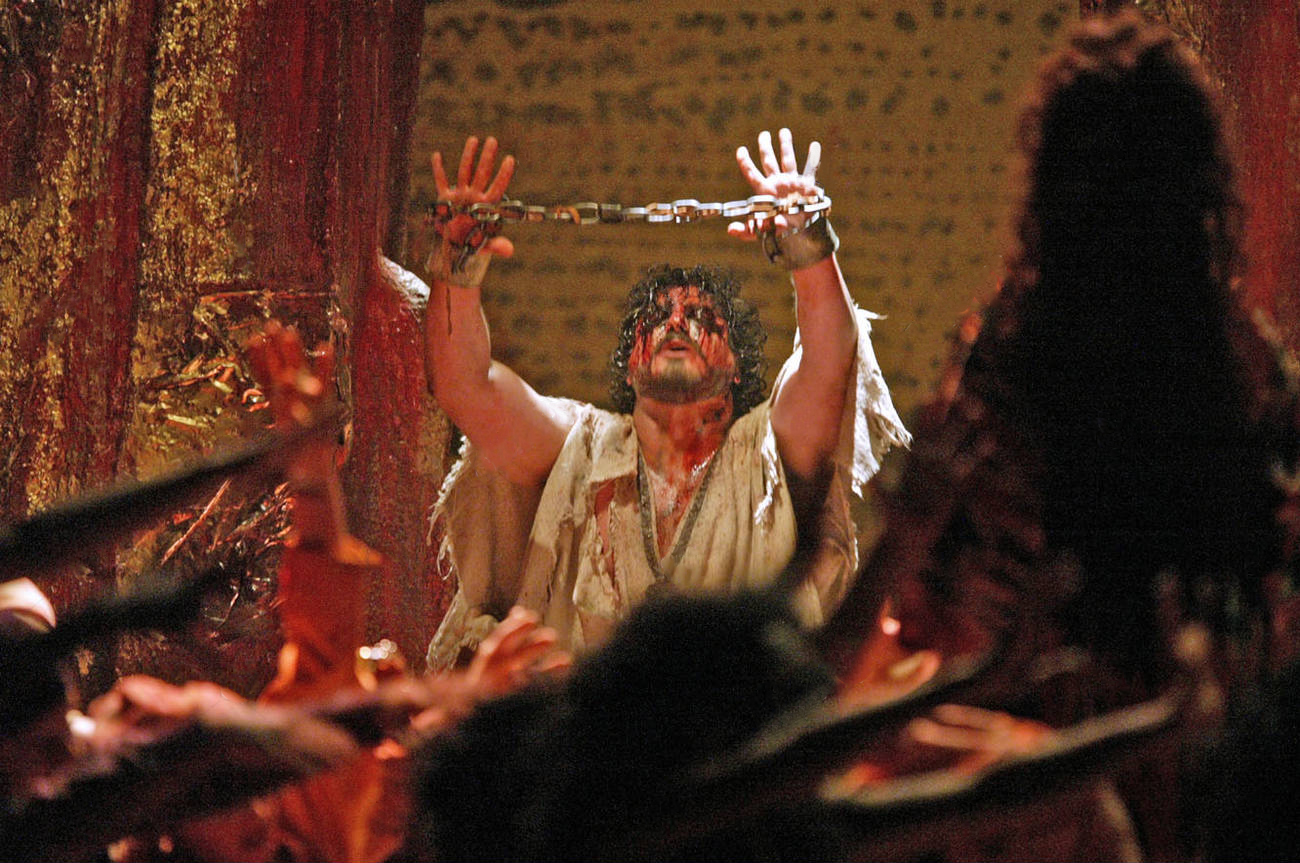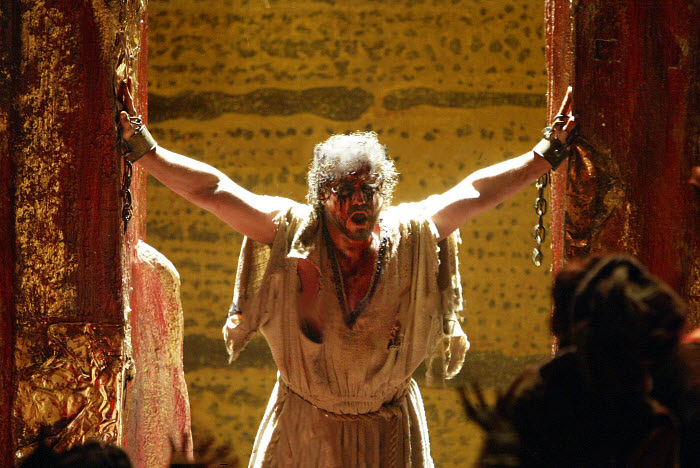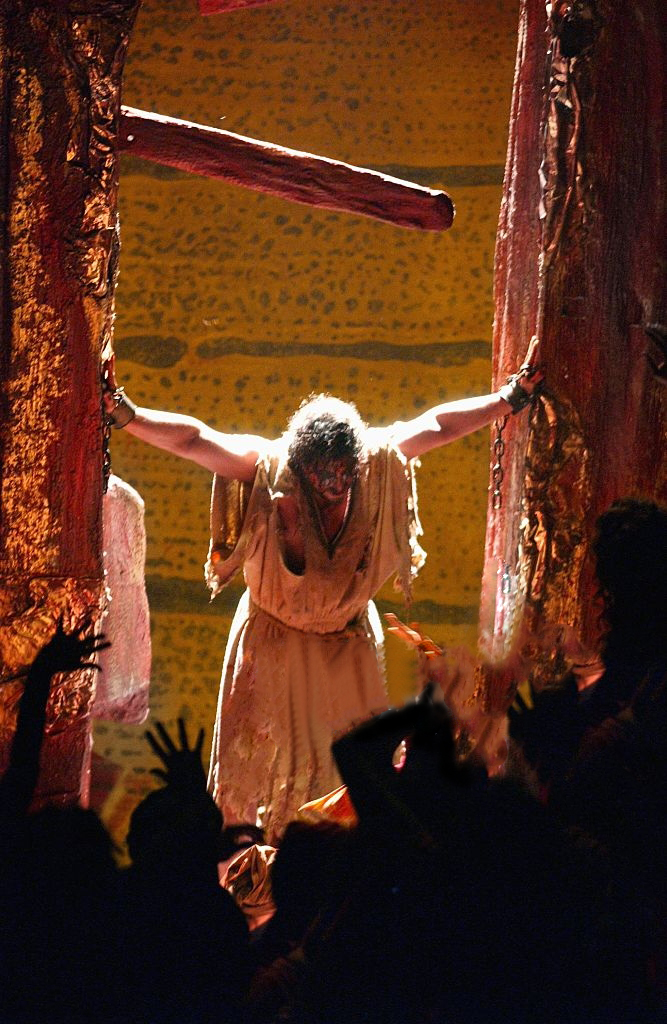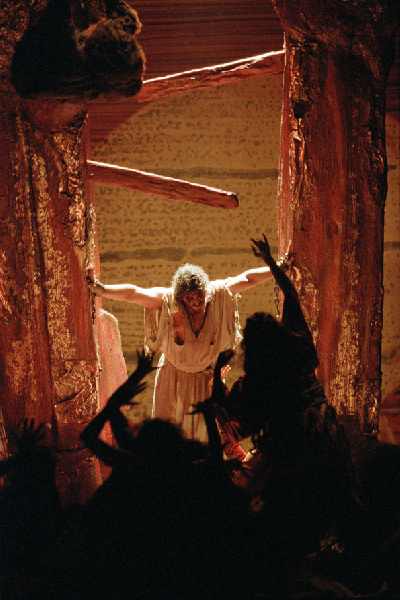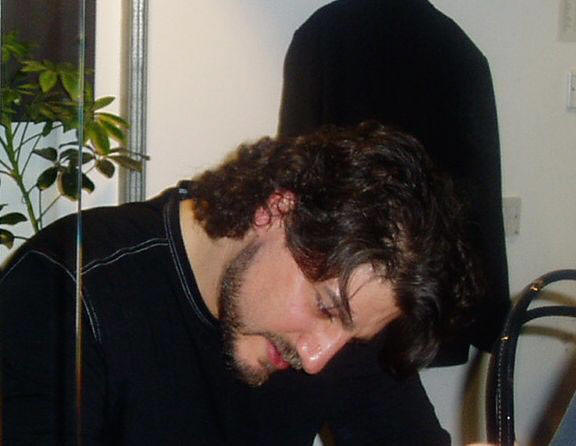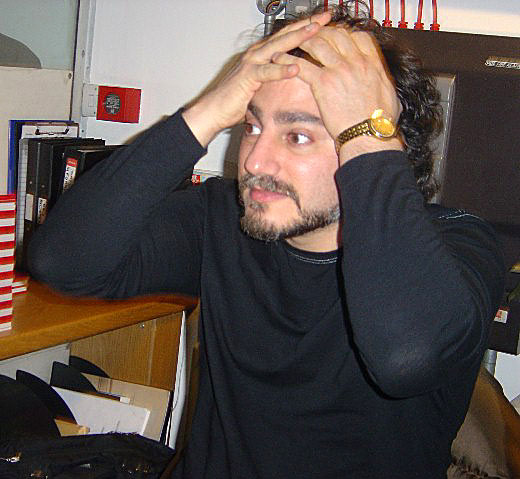

|
|
| Reviews
ďJosť Cura is a very strong Samson: his dark tenor is in good shape with a ringing power, and he is an actor of fearless physicality.Ē The Times, 15 March 2004 ďReally any production of the work needs only a persuasively butch Samson. Josť Cura answers the first need to a T, and, furthermore, since I last saw him in the role he has developed an amazing capacity to sing quietly, so that his assurances to Dalila after she had opened her heart to his voice that 'Je t'aime' were positively murmured. Mostly, though, he was singing at full throttle, and sounding superb.Ē The Spectator, 27 March 2004 ďJosť Cura [brings] youthful vigour to this testing role. The dashing Argentinian finally seems to be shedding his tendency to play shamelessly to the gallery, not least to his blue-rinse groupies. In this incarnation, Cura is wholly convincing, even moving during the treadmill scene, edging me reluctantly towards a rare use of that dodgy critical word 'definitive'.Ē The Observer, 21 March 2004 ďSamson Ö is a difficult role to fill; Cura does a good job. His voice is darker than it was last year, almost as if he was conjuring a sound suitable for the old testament prophet. Act 3 opens with Samson alone, chained to the mill wheel. Here Cura was on tremendous form...his strong performance was a striking contribution to the evening. He gave a wonderful variety of tone color, as he had done throughout the opera, and he made a profoundly moving figure. Cura's final contribution, bringing with it the collapse of the Philistine temple, brought the evening to a triumphant close.Ē Music and Vision, March 2004 ďThe Argentinian Josť Cura now ranks as one of the world's top Samsons. Large and muscular, he looks ready to topple any old temple and moves with the sass of one who knows as much his remorseful Act III aria, when shorn and eyeless in Gaza he turns the mill, had real force.Ē The Evening Standard, 15 March 2004 ďJosť Cura reacts to Denyce Graveís Dalila as one spellbound, tracking her every move with his huge eyes, fondly her body at every opportunity. His Samson is at once a sensualist and a fanatic, a man in whom desire and spiritual conviction burn with equal, violent intensity. He responds to Gravesís seductions with honeyed whispers and captures Samsonís mental and physical agony with frightening vividness in the closing scenes.Ē Guardian, 15 March 2004 ďJosť Cura gives a performance of great power; the chemistry is just right between these two great singers. It is not always so, but when it happens, it produces sparks of magic.Ē Whatís On, 24 March 2004 ďArgentinian Josť Cura, arguably the most gifted spinto tenor of his generation, has wonderful moments. He is sturdy and handsome as the Israelite championÖĒ The Stage, 18 March 2004 ďCura found the meaty core of his dark, masculine tenor (and he looked ideal for the role).Ē Opera Japonica, 13 April 2004 ďIt has to be said that [Denyce Graves] and her Samson, Josť Cura, looked really comfortable with each other. The body language of their fateful tryst was the one great lie that the production made believable - her deceit, his desire. Cura looks great in the role - and he sounds pretty good, too. The swarthy complexion of the voice has always been his strong selling point. And that's what counts in this role - middle-voice masculinity.Ē The Independent, 17 March 2003 "...Lastly, there was Josť Cura, commanding of aspect and with a nice line in suffering and staggering for the Act 3 solo. It would be churlish to linger on the mannerisms but surely he needs to iron out those now near-persistent swoops up to the note for 'expressive' effect. These tics are doubly frustrating when they accompany such splendid vocal and musical gifts, such tremendous focus at the top of the voice, and a matching ability to sing quietly and beautifully when the music needs it. By the end of the Act 2 love duet, I was teetering, almost willing to believe this opera worthy of the extravagant praise some continue to heap on it." Opera, May 2004
|
|
|
|
How the fit and fabulous stay that way: Josť Cura, 41
Times Online Rosie Millard March 20, 2004
How fit does an opera singer have to be? These days you canít get away with being unfit on stage. When I was younger, I was a semi-professional body-builder and I also trained as a kung fu fighter. But when I was 24 I gave it all up as I had a vision of what I might become. I couldnít even touch the back of my head because my arms were so massive. Now I just work out on machines at the gym in my home in Madrid and when I am travelling I try to stay in hotels with gyms. Did you aspire to be the next Arnold Schwarzenegger? He was the hero for us all; him and Lou ďIncredible HulkĒ Ferrigno. Of course they look like babies compared with todayís bodybuilders. Youíre also a composer and a conductor. Do you ever worry about trying to do too much? When you have two or three talents, you have to decide whether to just use one and hide the others. The music world is fond of labelling people, but at the end of your life you will have to explain to that being who gave you your talents why you were so cowardly as to not use them all. Ah, the famous ego. Some critics have had a bit of a field day at your expense. I used to care what the critics said. I used to suffer, especially when the criticism was suspiciously bad. But I would rather not talk about it except to say that people always criticise eclecticism. As an opera singer do you have to stick to a strict regime? Because I was a semi-professional athelete for many years I learnt how to eat well. Before a show I have a big plate of pasta, for energy. What with make-up and singing, then all the after-show business, you can be working for five hours at a stretch. Ever tuck into the steaks? I was a vegetarian for about five years in my twenties, then one day I woke up and thought it wasnít too smart to lose my barbecue. But when I was a vegetarian I weighed 20kg (44lb) less. Champagne or sparkling water? I donít drink. Well, I have a finger of wine when I eat meat, but I canít handle any more than that. If I do, I start talking nonsense. I guess the smokes are out of the question? Actually I smoke a pipe when Iím at home. Itís not something I canít do without, but itís pleasant. I never smoke in London. The air is polluted enough already here. You are quite physical on stage. Have you ever suffered for your art? No, but in the past Iíve had many injuries, particularly to my back and knees because of all my weight training. Yet thanks to all those years in the gym I have a miraculous cardiovascular system. My heartbeat is 52 to 54 at rest. When I go on stage it reaches only 80 beats, which is akin to resting for other people. It gives me a huge advantage ó I am never out of breath. Do you pop any pills? Now that Iím in my forties I take supplements including vitamin E for hair and nails and vitamin C in winter. How do you cope with the nerves? When you cross the stage for the first time each night you need to be a little nervous. Thatís normal and good and it helps to break the ice with the audience. Naturally good looking or do you attack the make-up? Iím a Neanderthal man as far as my face is concerned, but all that heavy make-up that I have to wear when I am on stage does it no good. Every so often my wife insists that I go to a spa and have a facial. Do you sleep well at night? Now I am 41 I have achieved mental peace. I donít worry about what people think. I have found audiences are ready to take the love I give them on stage. And I try to live my life as intensely as I can, knowing that itís the only one I have. What spurs you on? The goal is always the same, to be a Renaissance man. If I were only a singer, Iíd be more relaxed. Iíd go to the movies on my days off. But Iíve decided to complicate my life with conducting and a recording company and composing. Iím also a keen photographer and Iím going to publish some of my photographs in a book. Josť Cura is performing at the Royal Opera House, Covent Garden (020-7304 4000), in Samson et Dalila until March 25
Forgotten Heroes by Josť Cura (interview with Charlotte Cripps)
always admire those who work quietly behind the scenes, behind the mask. I came back to the Royal Opera House to sing in Samson et Dalila and as I walked through the corridors and saw all the make-up artists, the dressers, the stage managers, assistants and so on, I came to the conclusion of how little we know about these people behind the curtain. I felt these were my forgotten heroes because I can't be on stage without them. But how do I put this group of people in one person? The Lone Ranger is symbolic of all the people not in the limelight, doing a lot but whom you may never know.
Josť Cura Ė Interview Classic FM
ĎIíd been conducting for several years before I discovered I had a good singing voice. I decided to take singing more seriously, as itís easier for a singer to get inside the international picture than a conductor, and if you are a tenor, even betteróand if you are a dramatic tenor, even better still. ĎIíve worked hard over the years. I recently turned 40 and I donít recall a period when I havenít studied very hard. People have often commented that I look effortless when I sing, but itís because Iíve practiced very hard. Itís like watching a dancer do a major jump and you know itís very tough and challenging, but when they are in the air, they smile and you think it must be easy. ĎEver since I started singing, Iíve been filmed, so I have learned to adapt my physical gestures to the dryness of the camera. I think my past as a sportsman has been very important for my breathing technique. You must make it look as natural as possible. I hope to do more and more conducting, but itís just like starting at the beginning again. There are many preconceptions going against me, as itís hard to make everyone believe that a tenor can be a conductor. Thereís an idea that a singer is not a real musician, but I want to change that. ĎI didnít want to start conducting in an opera house, so my first concert was a challenging programme of Respighi, Kodaly, and Rachmaninov. One day I will sing less and conduct more, but I want to continue singing until my last breath. Iíd also like to work with young people. Iím very excited to have my own label, which started by accident, really. We recorded the Rachmaninov for fun, then realized we could do something with it. We didnít have the back-up support, though, so we made our own label! I donít know what we will do next, but whatever happens, itís going to be a nice adventure.í
|
|
|
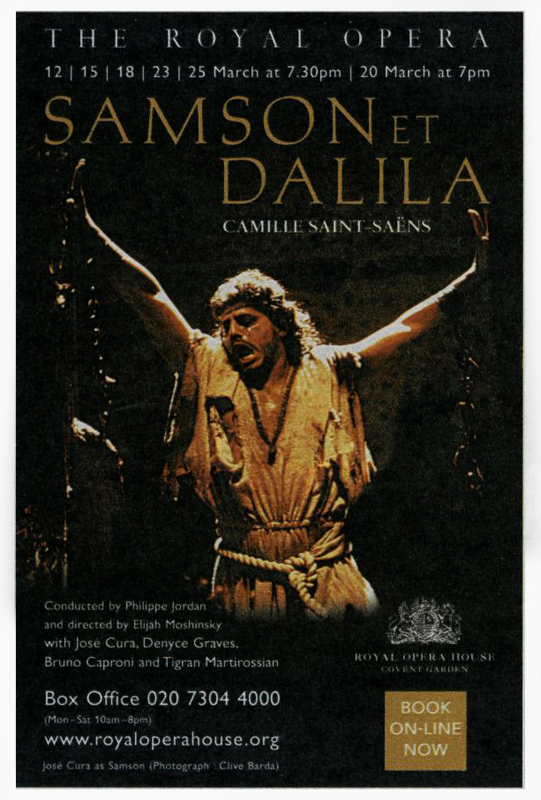
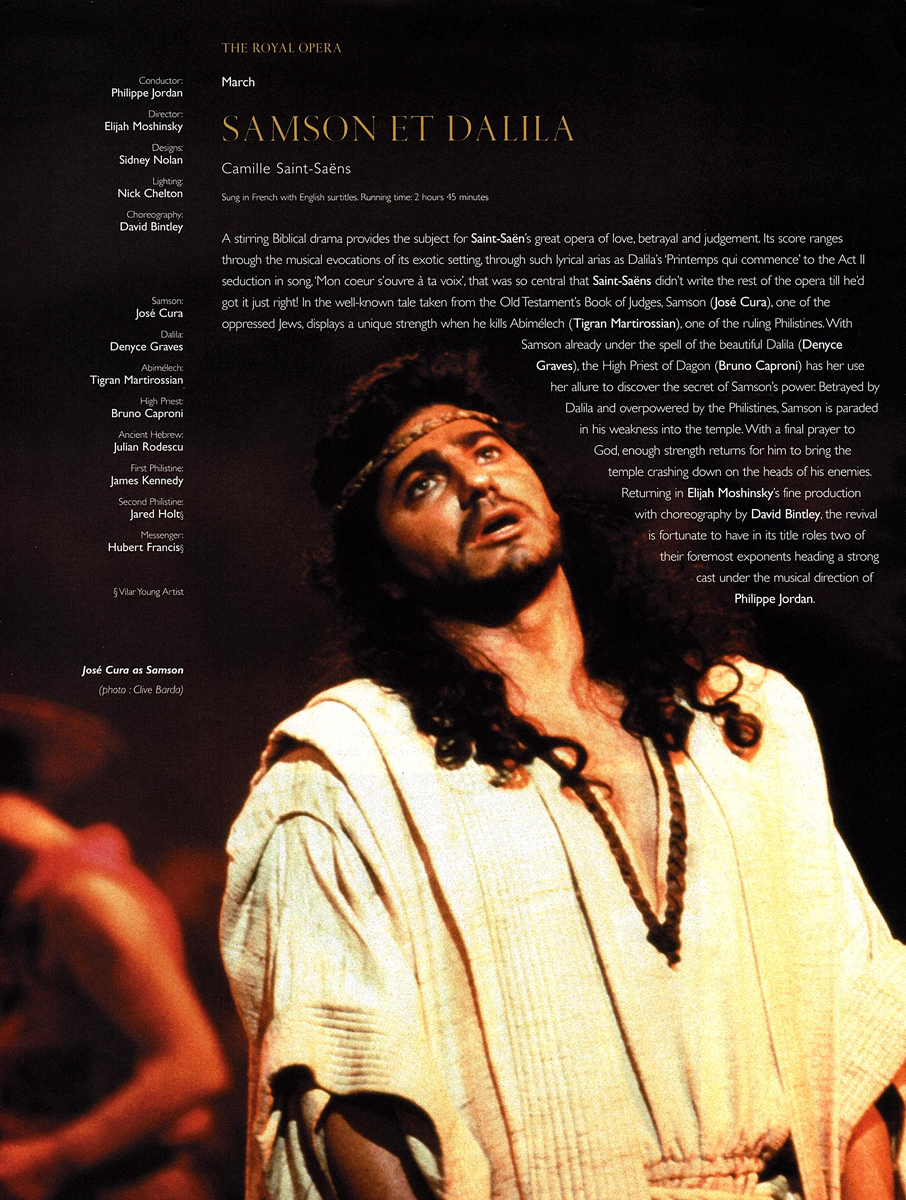
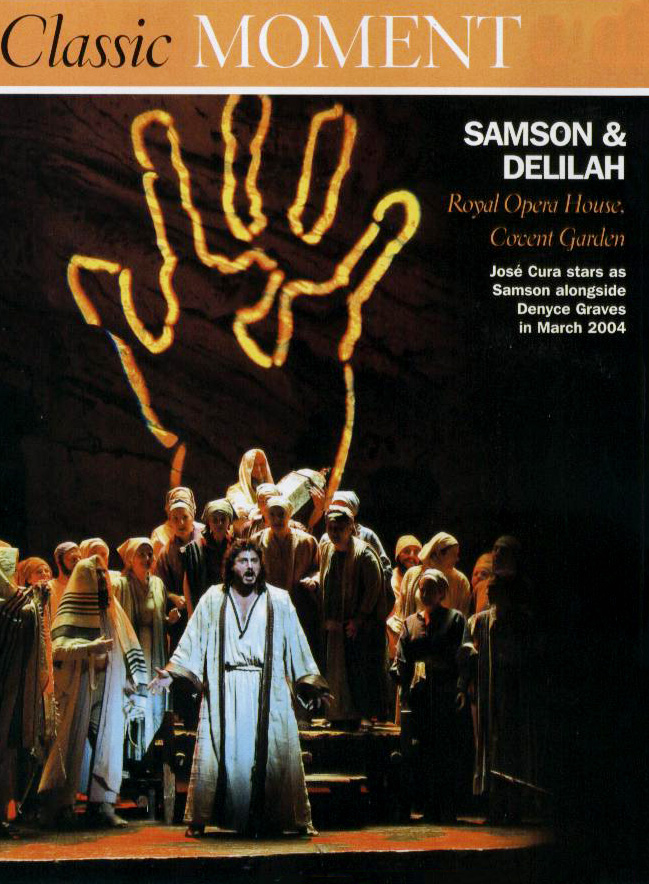
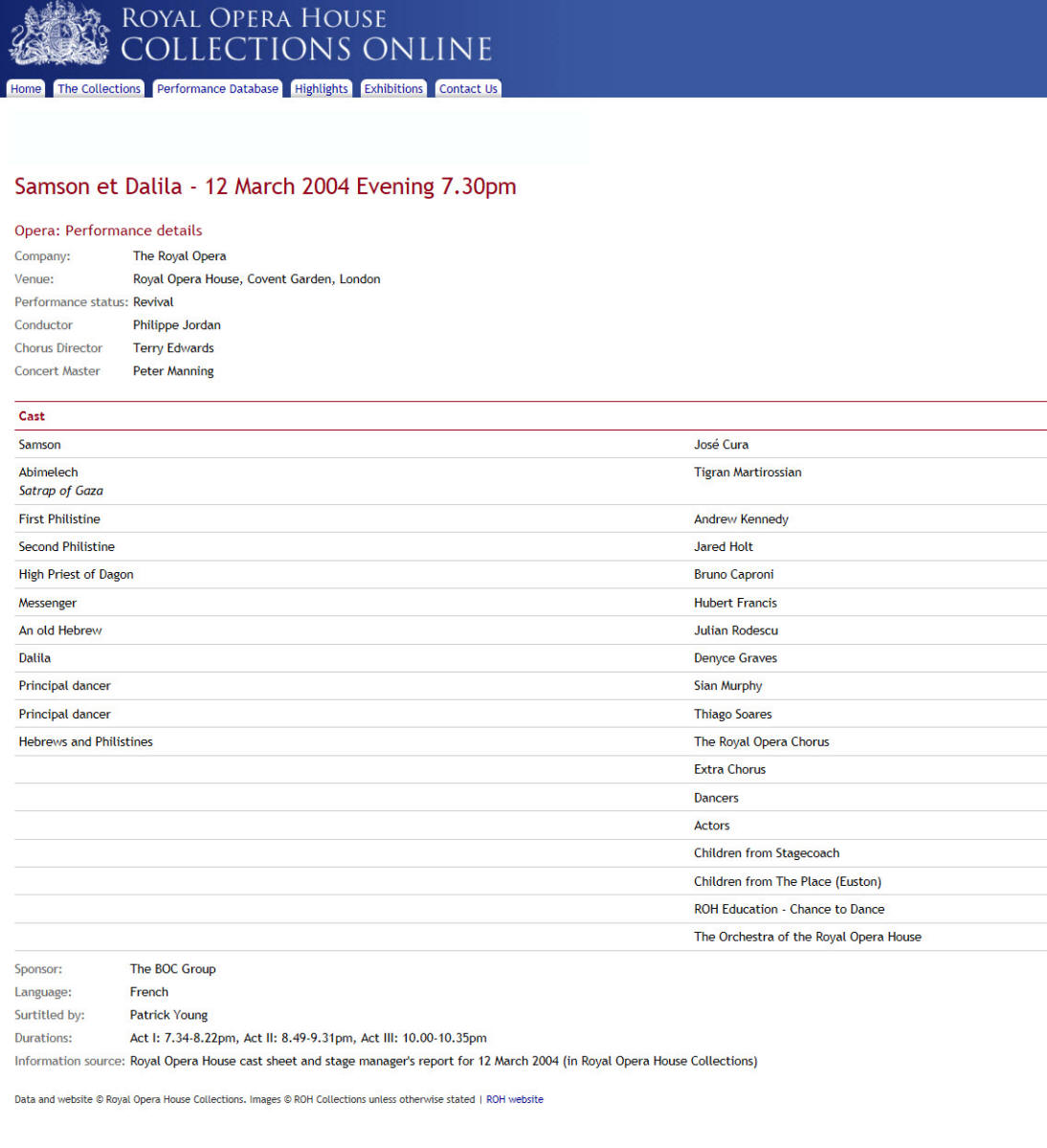
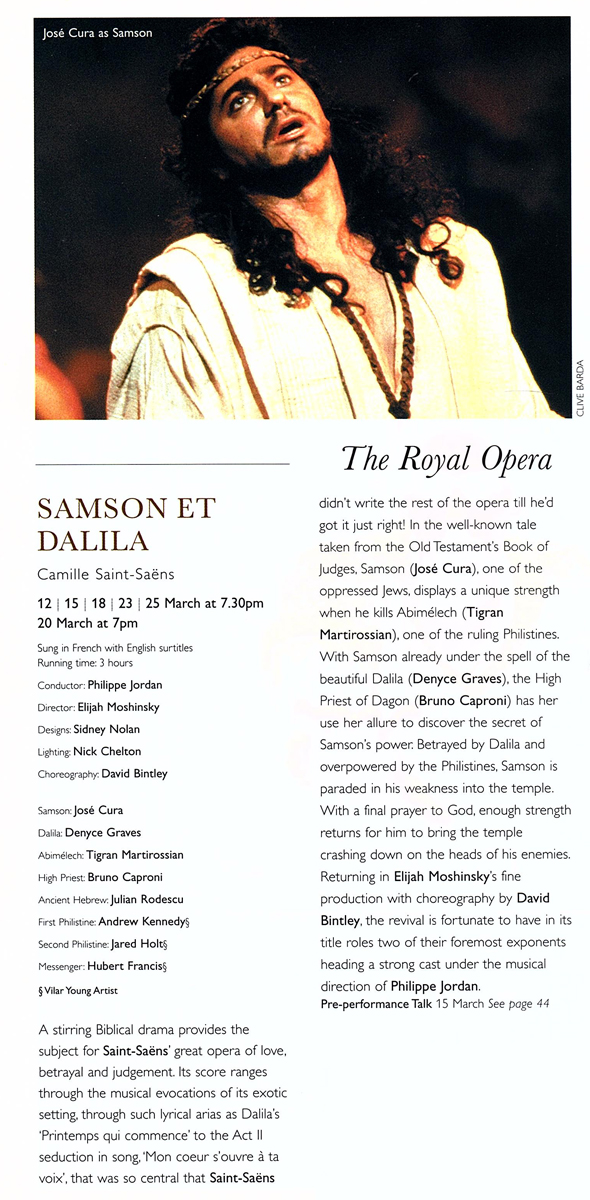
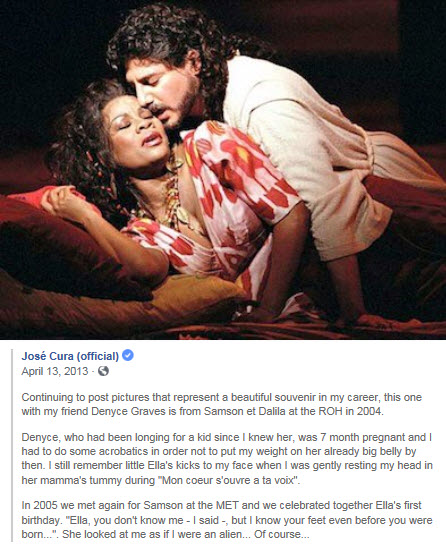
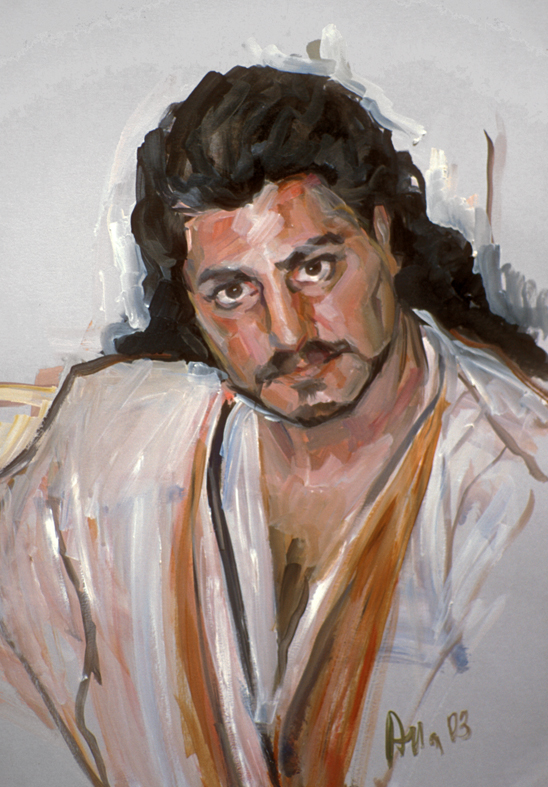
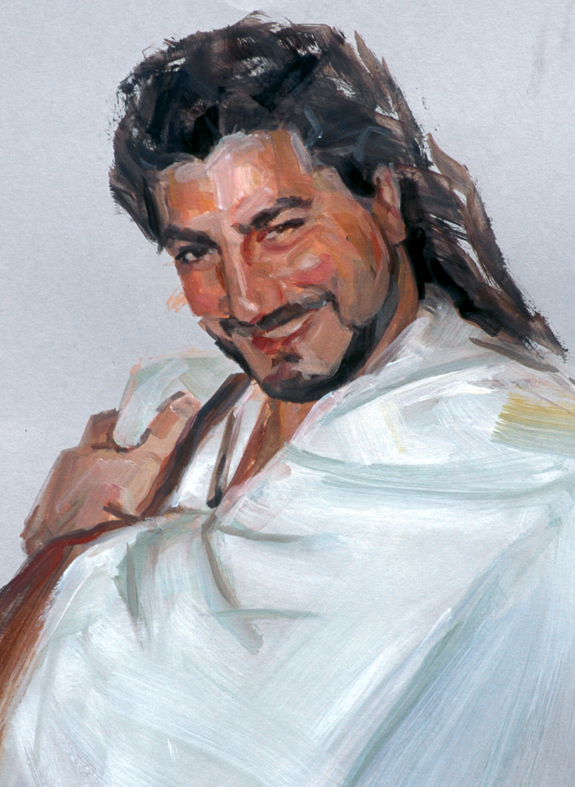
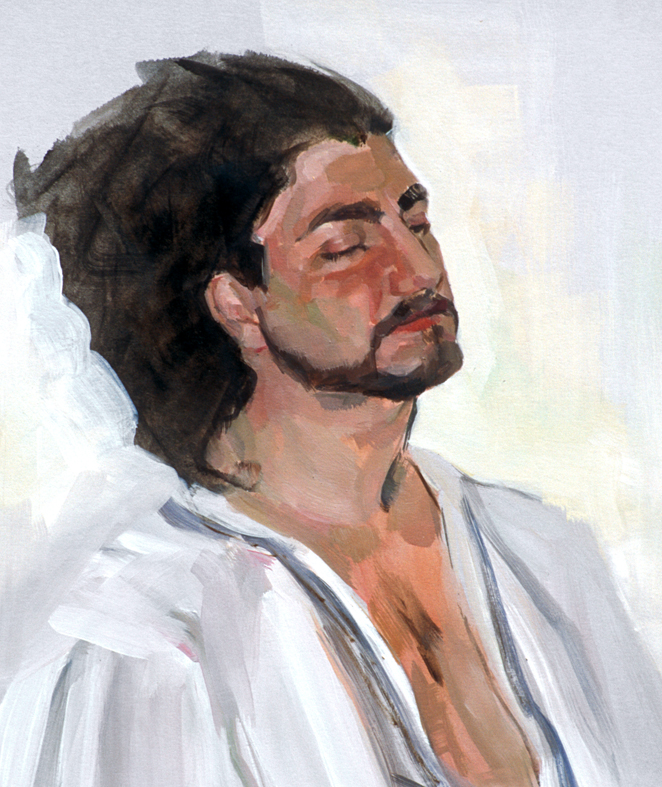
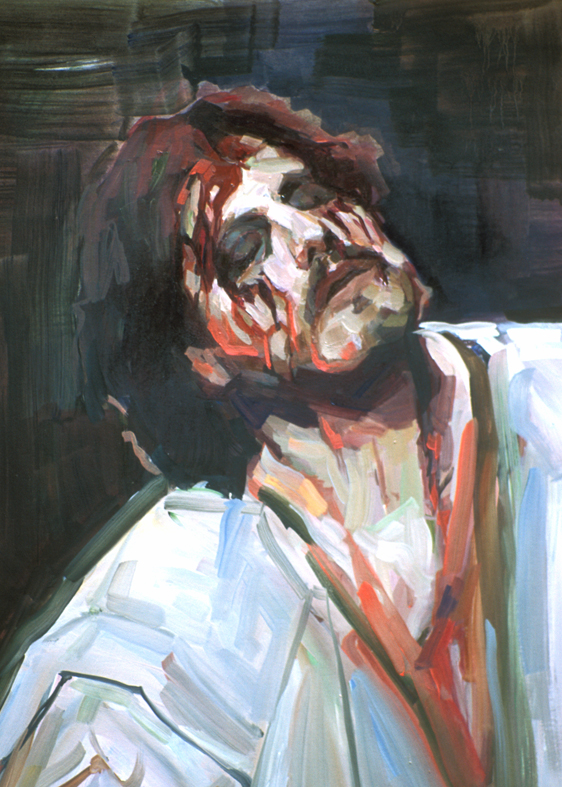
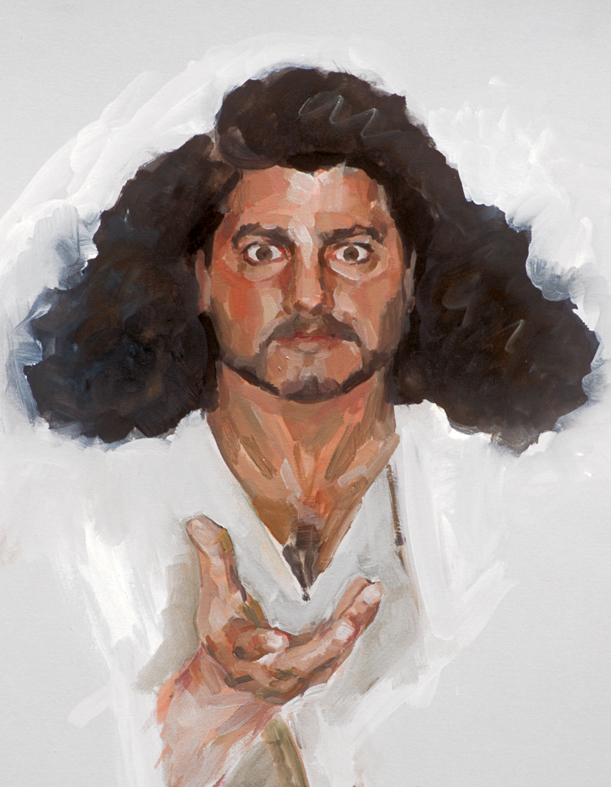
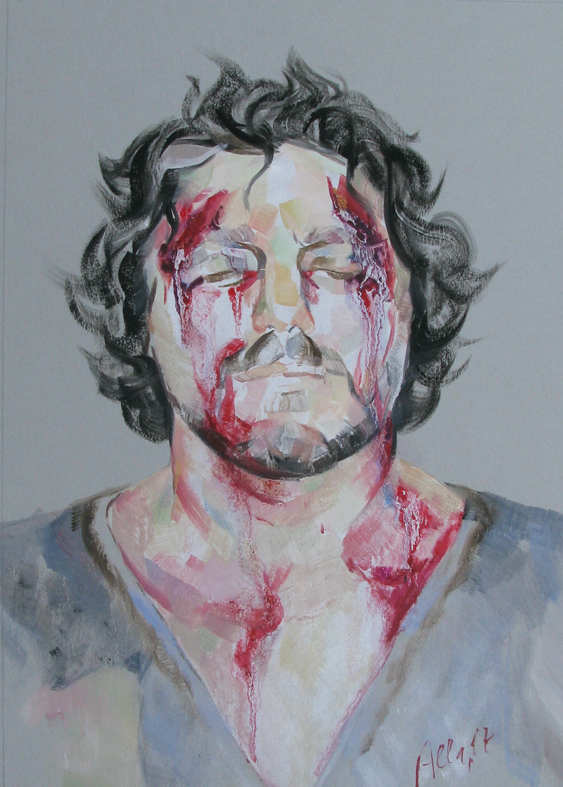
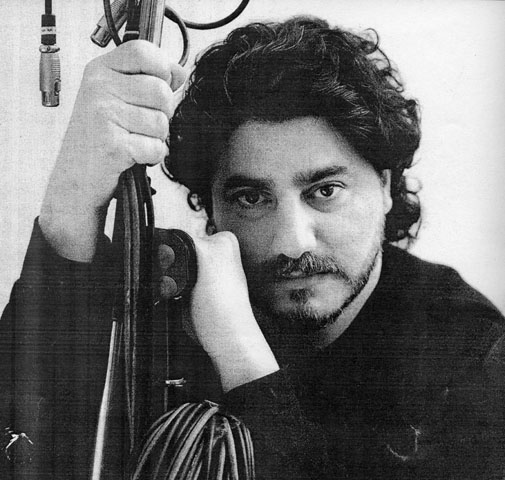 Youíve
been described as the ďFourth TenorĒ. Is it difficult to
always hit the high notes?
Youíve
been described as the ďFourth TenorĒ. Is it difficult to
always hit the high notes?
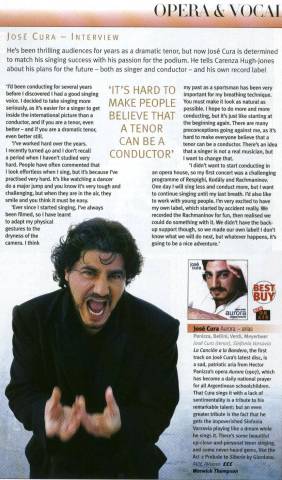 Heís
been thrilling audiences for years as a dramatic tenor,
but now Josť Cura is determined to match his singing
success with his passion for the podium. He tells
Carenza Hugh-Jones about his plans for the future - -
both as singer and conductor
Heís
been thrilling audiences for years as a dramatic tenor,
but now Josť Cura is determined to match his singing
success with his passion for the podium. He tells
Carenza Hugh-Jones about his plans for the future - -
both as singer and conductor